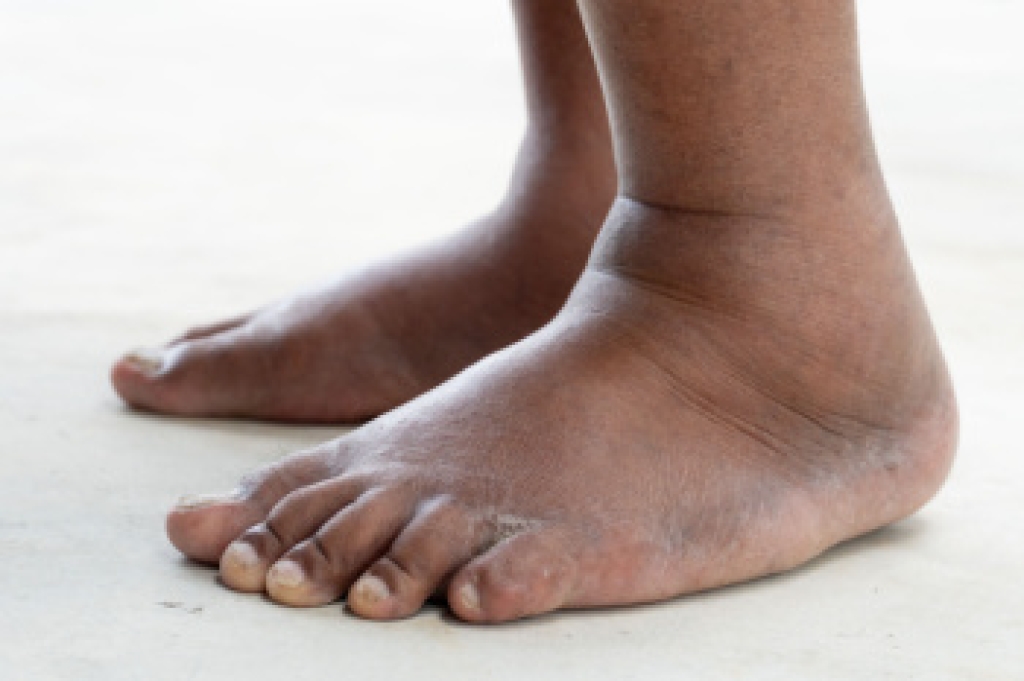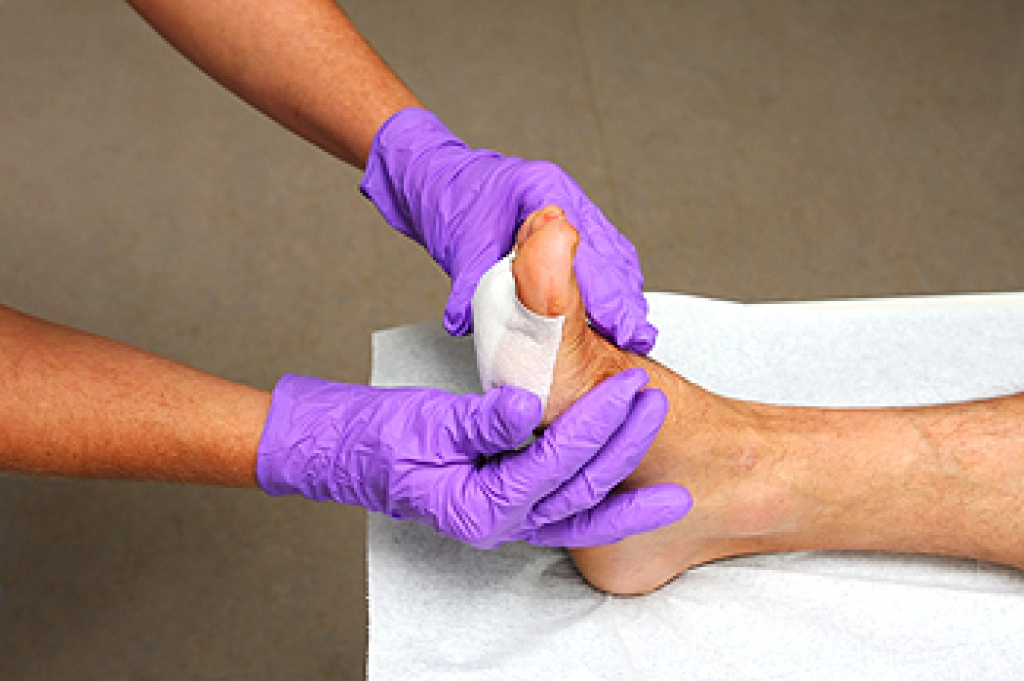Blog
Various Types of Foot and Ankle Pain

Foot pain can stem from a variety of causes, each affecting movement and comfort. Contusions may result from blunt trauma, causing swelling and discoloration, and may happen following an ankle sprain. Puncture wounds can lead to deep tissue damage and infection, if untreated. Ligament injuries often cause joint instability, while tendon injuries may limit flexibility and strength. Sprains stretch or tear the soft tissue around joints, leading to pain and reduced function. Each condition requires careful evaluation to prevent long-term complications. A podiatrist can diagnose the source of pain, provide targeted treatment, and guide recovery through footwear advice or minor procedures. If you are experiencing persistent or sharp foot or ankle pain, it is suggested that you consult a podiatrist for an accurate diagnosis and treatment.
Foot Pain
Foot pain can be extremely painful and debilitating. If you have a foot pain, consult with one of our podiatrists from PA Foot & Ankle Associates. Our doctors will assess your condition and provide you with quality foot and ankle treatment.
Causes
Foot pain is a very broad condition that could be caused by one or more ailments. The most common include:
- Bunions
- Hammertoes
- Plantar Fasciitis
- Bone Spurs
- Corns
- Tarsal Tunnel Syndrome
- Ingrown Toenails
- Arthritis (such as Gout, Rheumatoid, and Osteoarthritis)
- Flat Feet
- Injury (from stress fractures, broken toe, foot, ankle, Achilles tendon ruptures, and sprains)
- And more
Diagnosis
To figure out the cause of foot pain, podiatrists utilize several different methods. This can range from simple visual inspections and sensation tests to X-rays and MRI scans. Prior medical history, family medical history, and any recent physical traumatic events will all be taken into consideration for a proper diagnosis.
Treatment
Treatment depends upon the cause of the foot pain. Whether it is resting, staying off the foot, or having surgery; podiatrists have a number of treatment options available for foot pain.
If you have any questions, please feel free to contact one of our offices located in Allentown, Easton, Northampton, and Chew Street in Allentown, PA . We offer the newest diagnostic and treatment technologies for all your foot care needs.
Managing Swelling in the Legs and Ankles

Leg and ankle swelling, also known as edema, can result from a variety of causes, including circulation problems, injury, prolonged sitting, or underlying health conditions. It may feel tight, heavy, or uncomfortable, and the skin can appear stretched or shiny. Simple steps like elevating the legs, wearing compression socks, and reducing salt intake can sometimes bring relief. However, persistent or worsening swelling may signal something more serious. Conditions such as vein disease, heart issues, or lymphatic problems can all contribute to fluid buildup in the lower limbs. Because untreated edema can lead to skin damage, discomfort, or infection, ongoing swelling should never be ignored. If you notice puffiness that does not improve or comes with other symptoms, it is suggested that you see a podiatrist for an in-depth evaluation and the right course of treatment.
Swollen feet can be a sign of an underlying condition. If you have any concerns, contact one of our podiatrists of PA Foot & Ankle Associates. Our doctors can provide the care you need to keep you pain-free and on your feet.
Swollen feet are a common ailment among pregnant women and people who stand or sit for extended periods. Aging may increase the possibility of swollen feet and patients who are obese often notice when their feet are swelling too. There may be medical reasons why swollen feet occur:
- Phlebitis - A condition that causes the veins to become inflamed and can also cause leg pain.
- Liver disease - This may lead to low blood levels of albumin which is a protein. This can cause fluid in the blood to pass into the tissues and several areas of the body can become swollen.
- Heart failure - When the heart doesn’t pump properly the blood that is normally pumped back to the heart can pool in the veins of the legs causing swollen feet.
- Kidney disease - One of the main functions of the kidneys is releasing excess fluid in the body. This type of condition can make it difficult for the kidneys to function properly, and as a result the feet may become swollen.
- Deep-vein thrombosis (DVT)- This is a serious condition where blood clots form in the veins of the legs. They can block the return of blood from the legs to the heart which may cause the feet to swell. It is important to be treated by a podiatrist if this condition is present.
Swollen feet can also be caused by bone and tendon conditions, including fractures, arthritis, and tendinitis. Additionally, there may be skin and toenail conditions and an infection may cause the feet to swell. Patients who take medicine to treat high blood pressure may be prone to getting swollen feet.
Many patients elevate their feet to help relieve the swelling and this is generally a temporary remedy. When a podiatrist is consulted the reason behind the swelling can be uncovered and subsequently treated.
If you have any questions please contact one of our offices located in Allentown, Easton, Northampton, and Chew Street in Allentown, PA . We offer the newest diagnostic and treatment technologies for all your foot and ankle needs.
Custom Orthotics For Outdoor Activity

Embrace the great outdoors with confidence and comfort! Whether you're hiking, jogging, or exploring nature, Custom Orthotics are your perfect companion. Tailored to your foot's unique needs, they provide stability on uneven terrains and cushioning for those longer adventures. Don't let foot discomfort limit your outdoor experiences. With Custom Orthotics, every step is supported and secure. Call today to schedule an appointment.
Early Care for Serious Complications of Diabetic Foot Ulcers

A diabetic foot ulcer is an open sore or wound that typically forms on the bottom of the foot in individuals with diabetes. It is caused by a combination of poor circulation, nerve damage, and prolonged pressure or injury that goes unnoticed due to reduced sensation. Symptoms may include redness, swelling, drainage, or a visible sore that does not heal. Risk factors include uncontrolled blood sugar, foot deformities, and wearing improper footwear. A podiatrist plays a key role in early detection, wound care, infection prevention, and long-term foot health. If you have diabetes and notice any changes in your feet, it is suggested that you promptly contact a podiatrist who can help you to manage this serious condition and avoid complications.
Wound care is an important part in dealing with diabetes. If you have diabetes and a foot wound or would like more information about wound care for diabetics, consult with one of our podiatrists from PA Foot & Ankle Associates. Our doctors will assess your condition and provide you with quality foot and ankle treatment.
What Is Wound Care?
Wound care is the practice of taking proper care of a wound. This can range from the smallest to the largest of wounds. While everyone can benefit from proper wound care, it is much more important for diabetics. Diabetics often suffer from poor blood circulation which causes wounds to heal much slower than they would in a non-diabetic.
What Is the Importance of Wound Care?
While it may not seem apparent with small ulcers on the foot, for diabetics, any size ulcer can become infected. Diabetics often also suffer from neuropathy, or nerve loss. This means they might not even feel when they have an ulcer on their foot. If the wound becomes severely infected, amputation may be necessary. Therefore, it is of the upmost importance to properly care for any and all foot wounds.
How to Care for Wounds
The best way to care for foot wounds is to prevent them. For diabetics, this means daily inspections of the feet for any signs of abnormalities or ulcers. It is also recommended to see a podiatrist several times a year for a foot inspection. If you do have an ulcer, run the wound under water to clear dirt from the wound; then apply antibiotic ointment to the wound and cover with a bandage. Bandages should be changed daily and keeping pressure off the wound is smart. It is advised to see a podiatrist, who can keep an eye on it.
If you have any questions please contact one of our offices located in Allentown, Easton, Northampton, and Chew Street in Allentown, PA . We offer the newest diagnostic and treatment technologies for all your foot and ankle needs.

